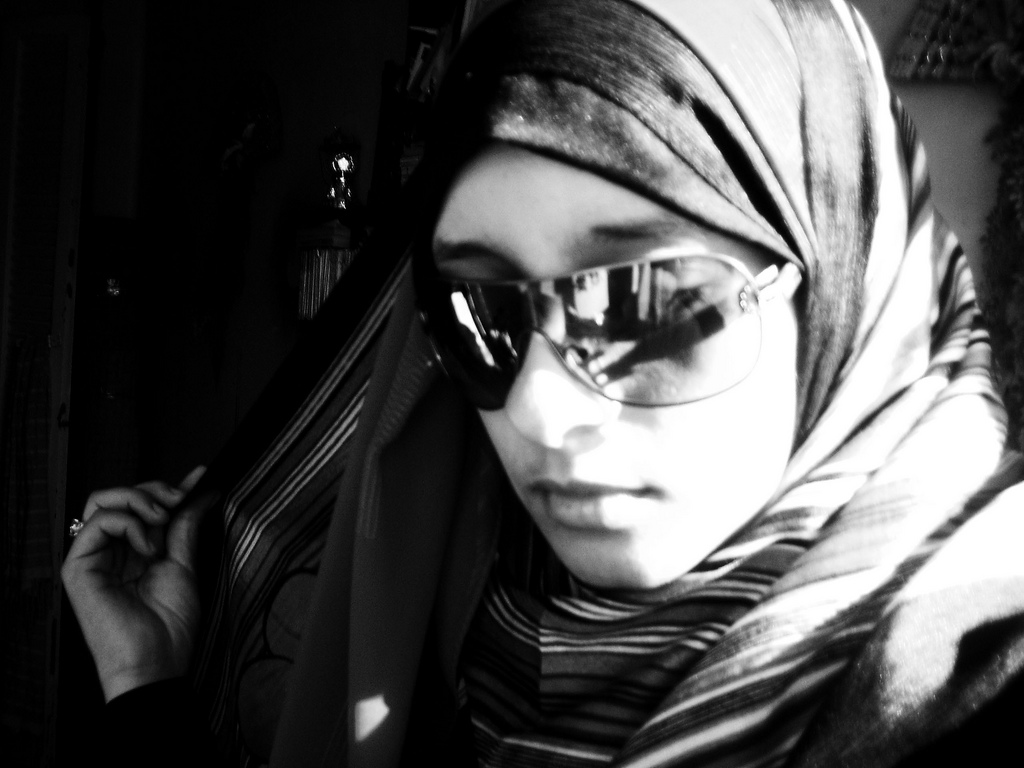I can’t believe I’m doing this. So early into my blogging career and here I am. Writing about hijab. I said I wouldn’t, because heck there’s so much more to talk about. But, here I am.
Hijab – a piece of fabric that so obsesses the world vis-a-vis Muslim women that we are now facing a full on “World Hijab Day”, which is today, Saturday, February the 1st.
According to the event’s Facebook page, the purpose of this (holi?)day is thus:
Our mission is to have 1 Million participants on February 1st, 2014 worldwide, insha’Allah! It is only through working together we can achieve: ‘Better Awareness. Greater Understanding. Peaceful World.’ Our goal is to foster global religious tolerance through Hijab awareness. Please inform your friends/family (Muslims/non-Muslims). Please note that hijab doesn’t only mean headscarf. Hijab = Covering of the whole body including head, chest, arms, legs. Attire should be loose fitting.
Their website features stories of women wearing hijab, pictures of women wearing hijab, stories about pictures of women in hijab, and really so much happy-happy joy-joy on the subject of hijab that I find myself questioning my own reality. I initially felt conflicted – I watched the video of the founder, Nazma Khan, explain her experiences and difficulty wearing hijab. It’s hard not to feel emotionally pulled by her narrative and impossible not to acknowledge the kind of discrimination Muslim women who “cover” sometimes are subjected to. I understood her well-meaning motivations in launching this project. But as I went through the website, met by awkward poetry, entreating letters to beloved sisters, and a gallery of self-affirmation, I started feeling the same growing unease as I did when I saw the one-woman play “Unveiled”.
Which takes me, momentarily, to that play. “Unveiled”, a title that I already felt some aversion to, is a well regarded one-woman series of monologues rotating around different hijabi characters. I went with my teenage daughter and her classmates, intrigued with the possibilities playwright and actress Rohina Malik would present to us. A play that I had been planning to review but after sitting an hour with pen and pad in hand, couldn’t find the energy to do. Because my energy had been sapped. I waited, vignette after vignette, for a break in the cliched characters, hoping for a single narrative that didn’t force a contrived link between terrorism and personal stories of hijab, straining to identify the art wrapped inside layers of civil rights advocacy and dawaah meant best for high school audiences. My heart slowly sank through the performance as I thought “No, no, please, give us a woman whose hijab is incidental to the story. Unveil the actual lives of Muslim women!” I finally gave up, exhausted, bothered more by the missed opportunity of such a play rather than the artistic merits of the performance.
Bothered for the same reasons that “World Hijab Day” bothers me. The fact that most conversations about Muslim women, both from outside and inside our communities, inevitably begin and end at how we dress is the sisyphean rock we can’t seem to get out from under. As we become higher and higher achievers, even leaving our male counterparts behind, we can’t seem to escape the yoke of a hijabcenteric view. We dangle between Islamophobes who think we’re brainwashed/oppressed and some conservative Muslims who keep a stink-eye on us to make sure we’re covered enough. Forget our souls, forget our trials, forget our needs, forget our humanity, we are now all about a little piece of cloth.
But we’re not. I am not the sum of my hijabs. Neither is any woman I know. I don’t ever speak to a group of police officers, present at a conference, or meet someone new at a party and start with, “Hey, yeah, look what’s on my head”. My expertise, my education, my personal and daily activities have nothing to do with hijab. My achievements and those of my counterparts are not because of hijab or despite hijab. We are kicking ass and taking names so people recognize us as fully human and fully capable, and forget we’re even wearing hijab.
So while many tens of thousands of Muslim women do incredible work, raise families, run corporations, nonprofits, and households, we keep getting boiled down to the hijab. Efforts like “World Hijab Day” and plays like “Unveiled” reinforce the cliches and stereotypes we are trying so hard to escape. When is the last time you met or read about a non-Muslim woman and thought, ok fine, but what are her religious practices like? We don’t do this to other women, and heck we don’t even do it to Muslim men (though they have their own cliches to battle).
If there is a word to describe the effect that “World Hijab Day” and “Unveiled” bring to bear on Muslim women, it’s “reductive”. Please, fellow Muslim women, stop bringing all the focus on who we are down to hijab. It’s perhaps the least important feature about me and it’s also a highly personal one, an expression of my relationship to God. It’s as personal as my salaat, my fasting, my charity. It’s not any more relevant to the public sphere than what purse I happen to be carrying. I dare say no one who knows me personally would begin describing me with my hijab first.
Let me be clear about one thing though, something that may not have been clear in my Mipsterz piece or this one – I believe in hijab. I believe that it’s an obligatory act of worship for Muslims, both women and men in their own ways. I chose to adopt it about a decade ago, and it’s important to my relationship with God (though it’s a major jihad for me, but more on that another time). So this is not an anti-hijab rant. This is a stop-making-hijab-the-only-important-thing-about-us rant.
It’s important to note that I also don’t feel these kinds of projects are effective strategies to deterring discrimination against hijabi women, or increasing tolerance, or breaking down stereotypes. They reconfirm a caricature of us, where our identities are literally tied to the hijab. By the way, highlighting hijab also preaches to a choir that’s already on our side. The folks that need a learning on respecting Muslim women will only get one if they are introduced to us as intelligent, thinking, achieving human beings and our stories have very little (or nothing) to do with how we’re dressed. When I think about the sahaaba karaam*, the companions of the Prophet Muhammad**, I don’t recall much detail about how they dressed. But most Muslims can tell you clearly about their distinct personalities, what they did, what their contributions to society were.
I could get behind a “World Muslimah Day” that showcases the achievements and diversity of Muslim women, or a play about Muslim women that brings unexpected perspectives on our lives and concerns to non-Muslim audiences. But I simply can’t get behind the same old story, a story that limits us to hijab, or terrorism for that matter. There are too many anti-Muslim bigots trying, and getting paid well, to do that already. It’s our job to expand the possibilities of what it means to be Muslim, and not keep it in tiny boxes like others are trying to do. My female Muslim friends are battling disease, raising special needs children, caring for aging parents, looking for love, negotiating marriages, writing books, running marathons, making movies, counseling people in pain, traveling the world, advocating for health policy and immigration reform, assisting domestic violence victims, and doing a million things that are completely and totally unrelated to hijab. Our public narratives must start to reflect that. We will really have arrived when our hijabs are completely irrelevant to others, when they’re just part of the rest of an outfit, because who we are and what we do is our calling card and the only thing that matters to society. At that point, no one will care how we’re dressed.
*It’s the tradition of Muslims to say “Radhiallahu anhuma” (may God be pleased with them) after mentioning the companions of the Prophet Muhammad**
**It’s the tradition of Muslims to say “peace be upon him” after any mention of the Prophet Muhammad. We also send blessings after mentioning any Prophet, including but not limited to Adam, Moses, Abraham, and Jesus, may God be pleased with them all. Muslims, when you read this post and see an asterisk, say it. In your heart or out loud, just say it. Those of the not-Muslim persuasion can say it too. Ain’t nothing wrong with that.
Photo Credit: Rana Ossama
Rabia Chaudry is an attorney, president of the Safe Nation Collaborative, an Associate Fellow of the Truman National Security Project, and a columnist for the Muslim Channel at Patheos. This article was originally published on her Patheos Blog Split the Moon.





